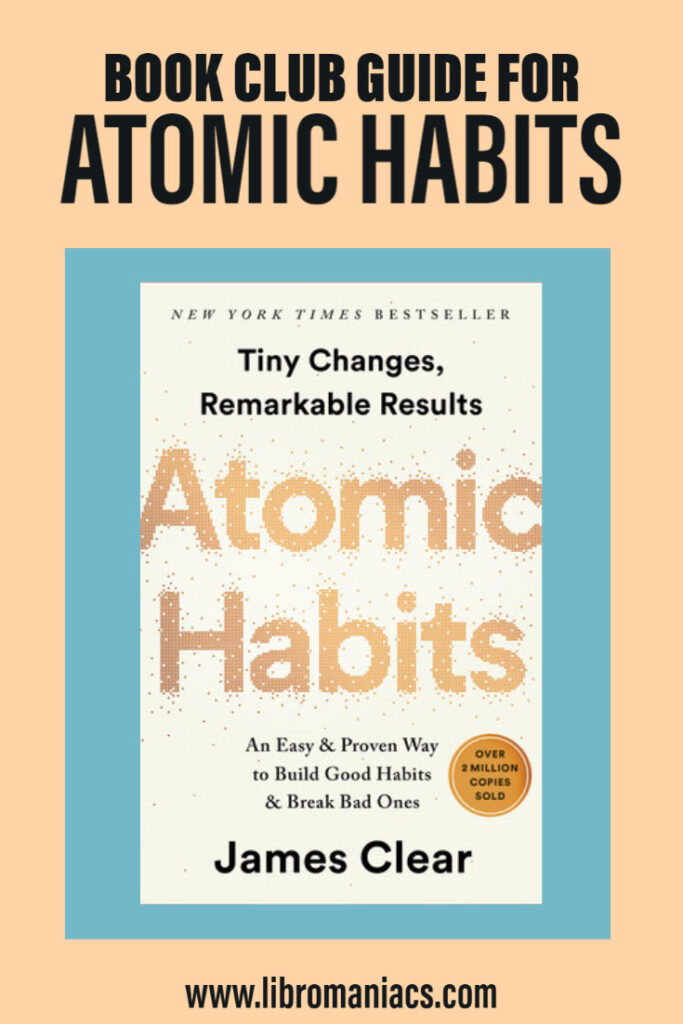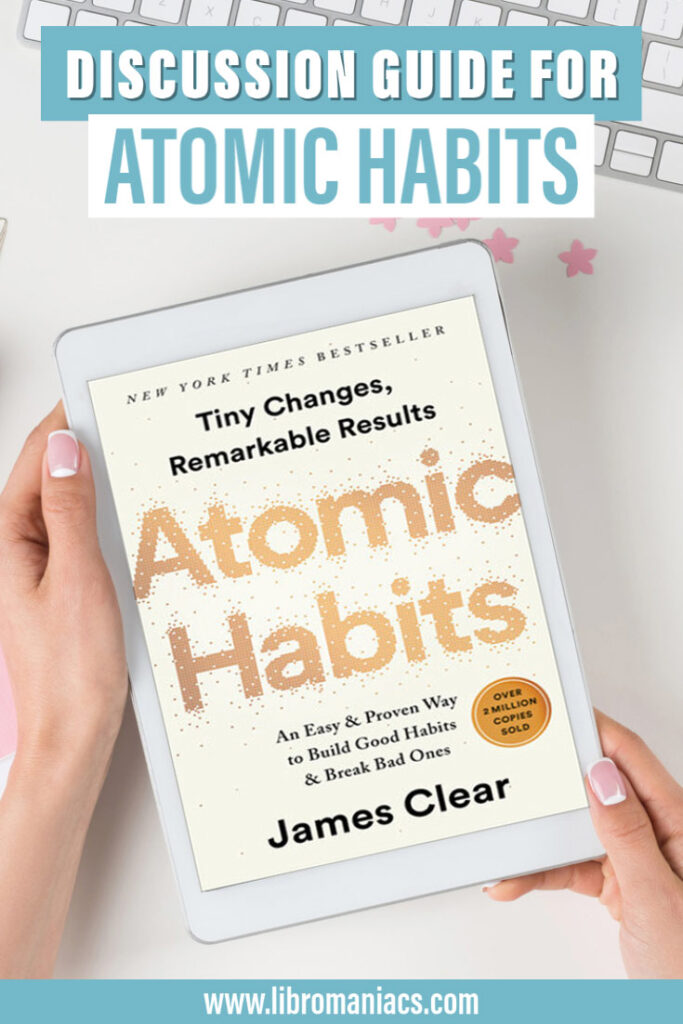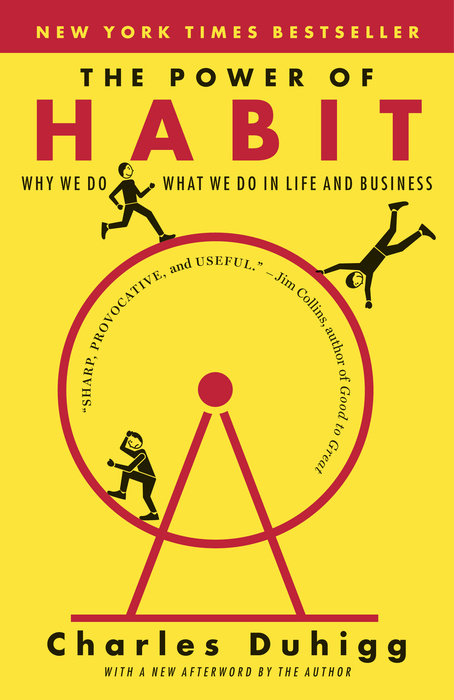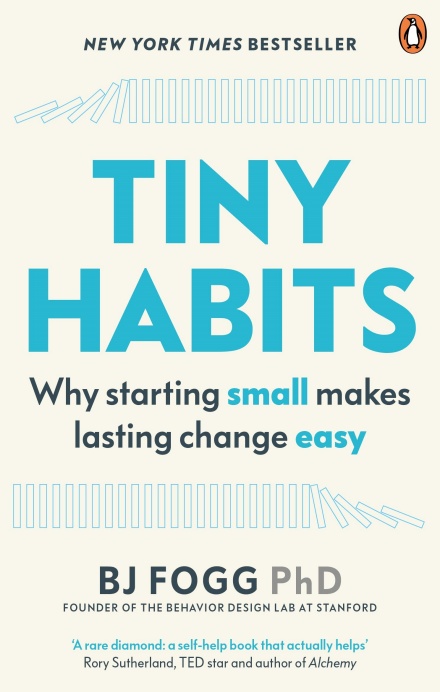Do you like to read self-help and productivity guides for your book club? Then Atomic Habits is a great choice. Author James Clear offers well-researched (and very do-able) advice on how to develop new habits and modify old ones. Reading Atomic Habits for book club is a great opportunity for you to open up to your friends and share good habits that you want to create…and bad habits that you’d like to ditch.
These Atomic Habits book club questions will help you get started with your conversation.
We have three ways to help you with your Atomic Habits book discussion. First, check out the publisher synopsis below. Does it accurately reflect your experience with the book? If not, how would you have written it.
Next, is a set of 10 Atomic Habits book club questions. These prompts will help you get the conversation started. We also offer a section that includes selective (and dare we say provocative) reviews that you can also use for your discussion.
Finally, if you loved the book, we also suggest three books like Atomic Habits so that you can keep reading.
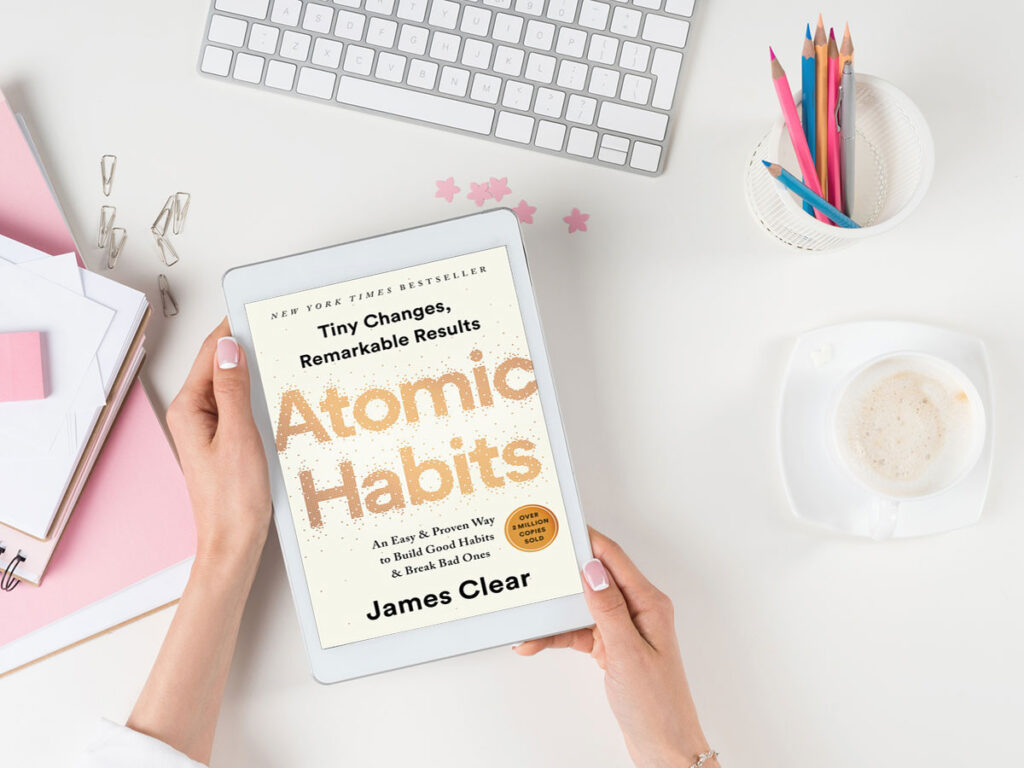
(This article contains affiliate links. This means that if you choose to purchase, I’ll make a small commission.)
Atomic Habits Synopsis
(We always chose to provide the publisher synopsis because we feel that it’s worthwhile to discuss whether the official book description actually squared with your experience of the book.)
Atomic Habits: An Easy & Proven Way to Build Good Habits & Break Bad Ones, James Clear
Tiny Changes, Remarkable Results
No matter your goals, Atomic Habits offers a proven framework for improving–every day. James Clear, one of the world’s leading experts on habit formation, reveals practical strategies that will teach you exactly how to form good habits, break bad ones, and master the tiny behaviors that lead to remarkable results.
If you’re having trouble changing your habits, the problem isn’t you. The problem is your system. Bad habits repeat themselves again and again not because you don’t want to change, but because you have the wrong system for change. You do not rise to the level of your goals. You fall to the level of your systems. Here, you’ll get a proven system that can take you to new heights.
Clear is known for his ability to distill complex topics into simple behaviors that can be easily applied to daily life and work. Here, he draws on the most proven ideas from biology, psychology, and neuroscience to create an easy-to-understand guide for making good habits inevitable and bad habits impossible. Along the way, readers will be inspired and entertained with true stories from Olympic gold medalists, award-winning artists, business leaders, life-saving physicians, and star comedians who have used the science of small habits to master their craft and vault to the top of their field.
Learn how to:
• make time for new habits (even when life gets crazy);
• overcome a lack of motivation and willpower;
• design your environment to make success easier;
• get back on track when you fall off course;
…and much more.
Atomic Habits will reshape the way you think about progress and success, and give you the tools and strategies you need to transform your habits–whether you are a team looking to win a championship, an organization hoping to redefine an industry, or simply an individual who wishes to quit smoking, lose weight, reduce stress, or achieve any other goal.
Atomic Habits Book Club Questions
These questions have been tailored to this book’s specific reading experience, but if you want more ideas, we also have an article with 101 generic book club questions.
- At the beginning of the book, Clear declares that this “… book is not an academic paper, it’s an operating manual “. Did he succeed in creating an operating manual?
- Many of Clear’s examples focus on one of three themes: financial habits, healthy life(style) and lifelong learning. Which of these theme was most resonant for you. Are there other themes on your mind? Or other types of habits that you’d like to break or build?
- Clear says that “Some people wait their entire lives for the time to be right to make an improvement.” And “Small habits helped me fulfill my potential.” He’s making the point that you can get started with small changes at anytime, rather than waiting for the perfect moment. Have you ever found yourself in the perfect moment trap?
- “You can break a habit, but you are unlikely to forget it.” What does Clear mean by this?
- Clear talks about three types of habit formation. The first is outcome-based, which is concerned with changing results such as losing weight or publishing a book. The second concept was process-based, such as decluttering a desk to become more productive. And then he talked about “identity-based habits” such as “I am the kind of person who eats healthy food” or “I am a regular writer”. Which of these processes did you identify with most?
- Clear describes how “the normal behavior of the tribe often overpowers the desired behavior of the individual”. He goes on to give examples of how a superior skill or habit can be subsumed in the interest of getting along with others. Do you have some habits that have been torpedoed by culture pressure or a desire to fit in?
- “Reprogramming your habits to highlight their benefits rather than their drawbacks is a fast and lightweight way to reprogram your mind.” One of the examples he gives is to reprogram your pregame jitters before a big presentation and frame it as the adrenaline and energy that you’ll need to focus on your presentation. How could you apply this concept to one of your good habits that sometimes suffers from a lack of motivation?
- “Boiling water will soften a potato and harden an egg. You can’t control whether you are the potato or the egg, but you can decide to play a game where it’s better to be hard or soft”. Atomic Habits is stuffed full of these metaphorical examples. Did you find them useful? Did it help you better understand the concepts being presented?
- The book also used a lot of charts to visually demonstrate some of the concepts around habit-building. Did you find them instructive?
- These self-help books often have one or two tips or concepts that really stick with you. Perhaps something actionable or an important bit of food for thought. Did you get one of those tips out of this book? What was it?
Selected Reviews of Atomic Habits
(Use these selected Goodreads reviews to compare with your own experience of the book. Do you agree or disagree with the reviews?)
“At the end of the day, who we are and what we will achieve depends so much on these small habits that we do every day. James Clear argues that focusing only on improving those habits will lead to much bigger changes and accomplishments.”
“It’s just what people need, another privileged marketer with an A-type personality telling people they can become like him if they follow his ‘secret formula’. The advice caters, especially, to this very specific group of people, the lifestyle-hacker extraordinaire – Tim Ferris wanna-bes.”
“I really enjoyed how easily digested this book was. We all have certain habits we want to learn or unlearn and we usually start strong but lack the motivation to stick to it. This book really expanded my mind about what it actually takes to make habits stick and how motivation has VERY little to do with it.”
“Well, there’s almost no single shred of original content here. It could be a fine book if it’s the first self-improvement book you have started to read.”
3 Books Like Atomic Habits
Clear’s website has a ton of additional articles and tools if you’d like to dive in more deeply. Here are some links to his habit-forming articles. He also references a number of other books that informed his how theories about habits. We’ve chosen three that you can consider for a good follow-on read.
The Power of Habit: Why We Do What We Do in Life and Business, Charles Duhigg
The Power of Habit sits at the more scientific end of the habit-building book spectrum. Duhigg blends scientific behavior studies and specific case studies to illustrate how habits are made and broken. He discusses how cues, routines and rewards can help you understand how to bake a habit.
Thinking Fast and Slow, Daniel Kahneman
This book tackles behavorial economics and psychology. In it, Kahneman explores our intuitive emotional pathways (fast) versus our more deliberative and logical pathways (slow). He offers practical insights into how we make decisions, revealing where we can and cannot trust our intuitions and how we can tap into the benefits of slow thinking. The book can be a bit wonky, but would be great if you are keen understand how you (and others) make decisions.
Tiny Habits: The Small Changes That Change Everything, BJ Fogg
If Kahneman and Duhigg’s more scientific approaches leave you cold, the consider Tiny Habits. It’s offers practical advice on how you can build good habits by taking small steps. He advises you “make it easy, make it fit your life, and make it rewarding”. It’s been popular with readers for its simplicity, fun and feel-good factor.
Have a listen on Audible. Try audio books for free for 30 days.
Share these Atomic Habits Book Club questions on Pinterest:
